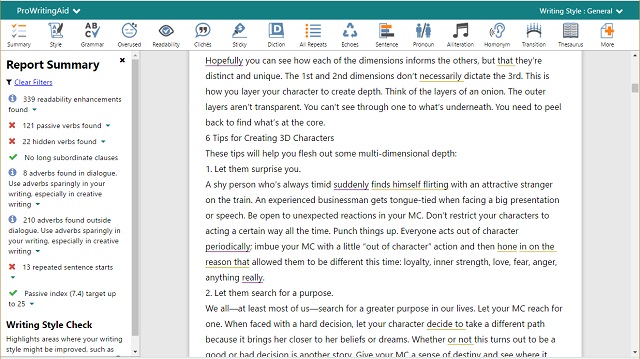
Grammar checkers in word processing programs are wonderful tools to help you catch pesky spelling and minor grammar issues like using the correct form of to, two, or too. But merely running your software's grammar checker may leave your work open to glaring problems you might not catch.
Editing software like ProWritingAid checks for writing issues that go far beyond mere grammar problems.
Here are 10 writing issues that your word processor's grammar checker is missing.
1. Adverbs.
Too many adverbs modify or prop up weak words. Use an editing tool to highlight every adverb in your text. Is it necessary, or can you replace it with a stronger word or phrase?
2. Slow pacing.
You want readers to keep moving through your work, so use an editing tool to check how much introspection or backstory you're including. It slows down your reader, and too much can get boring.

3. Overused words.
You may not notice as you write, but words like could, might, knew and felt slip into your work, taking away some of its power. An editing tool will point out those words that are clunky, non-specific, or that tell rather than show.

4. Sentence structure.
Do you vary your sentence lengths? Short sentences move readers quickly. Longer sentences allow you to expound on your meaning more fully, keeping readers in the moment and engaged. Too many long sentences or short sentences are boring, though. An editing tool will create a visual representation of your text so that you can see whether you have enough variety.
5. Active verbs.
Verbs keep your work moving forward. Passive verbs leave your readers wondering who's performing the action in your sentence. Hidden verbs use a weak verb and turn strong verbs into nouns. For example, why say "the issue was discussed" (passive) or "the committee held a discussion about the issue" (hidden verb) when you could say it clearly with "the committee discussed the issue"? An editing tool will highlight both passive and hidden verbs for you.
6. Sticky sentences.
Glue words are common words in the English language that leave empty spaces in your sentences. Words like an, of, if, to, the and about 200 more can be cut down to make your meaning clearer. "She was able to use the key on her key ring to open the door to the storeroom to find the supply of paper stock she needed for class" should be rewritten to "She unlocked the storeroom door and found the paper stock she needed for class."
7. Clichés.
Everyone knows that clichés are taboo, but the sneaky devils can creep into writing without your knowledge when you're in the writing flow. Use the editing tool to find any clichés and replace them with original, fresh wording.
8. Redundancies.
Watch out for redundancies in your writing. Who hasn't written about "frozen ice," but ice is always frozen, right? "First began" and "gathered together" are other common redundancies that can creep into your writing.
9. Inconsistencies.
Pay attention to inconsistencies in spelling in your work. An editing tool will highlight if you use American spellings like color and neighbor in one sentence, and the British spelling of labour in another. Also watch out for inconsistencies in capitalizing and hyphenating words.
10. Vague wording.
Vague wording doesn't get your meaning across clearly. To say you will give someone “some” money doesn’t mean nearly as much as if you say you will give them “$100”. Similarly, if you say you “improved” your attendance record, it’s much less clear than if you say your attendance record rose from 67% to 97%. Be specific.
Conclusion
These are some of the common writing faux-pas that grammar checkers don't catch, but can leave those reading your work wondering about your writing ability. You want your work to be clear and concise, with every word making an impact.
Use ProWritingAid to uncover the above issues before you send it off to your editor.
Your editor, publisher, and—more importantly—readers will thank you for it.

